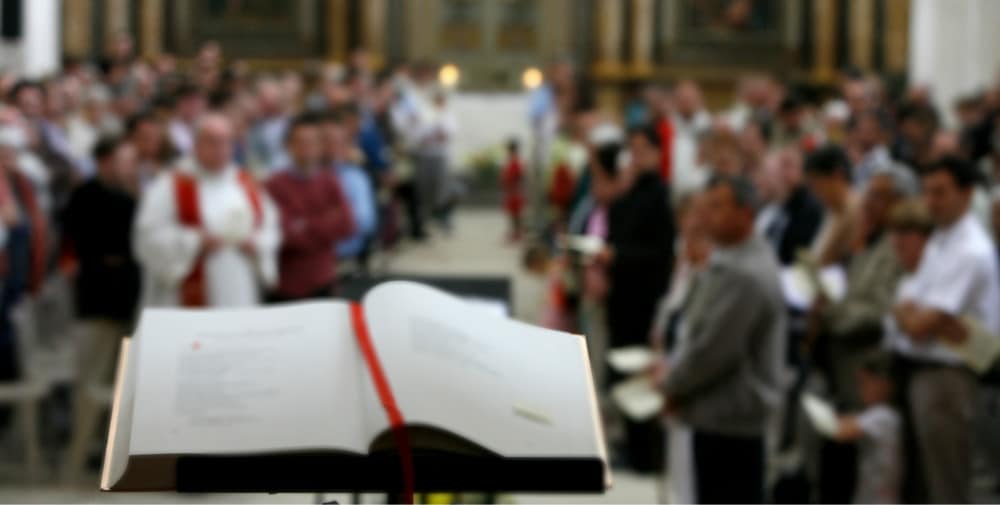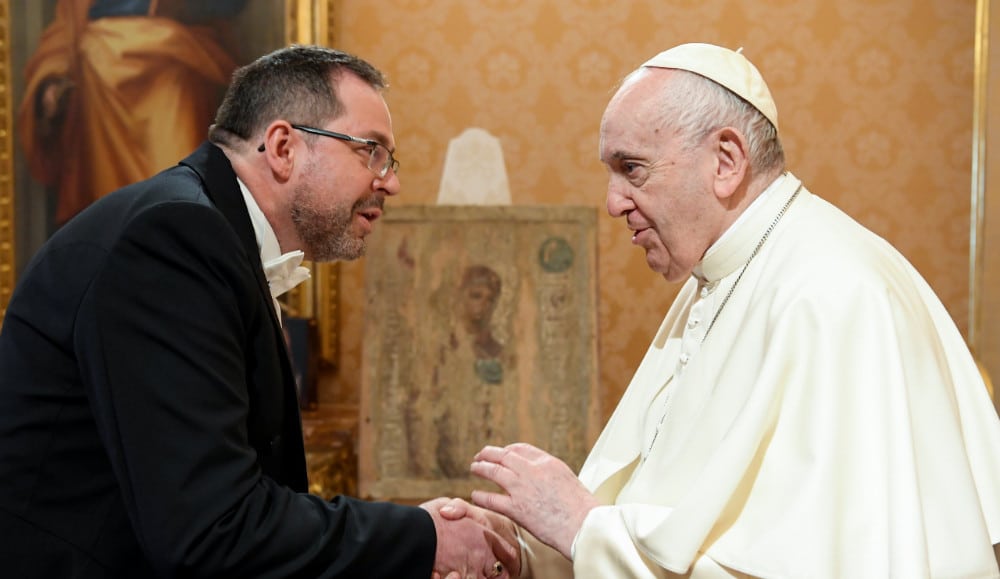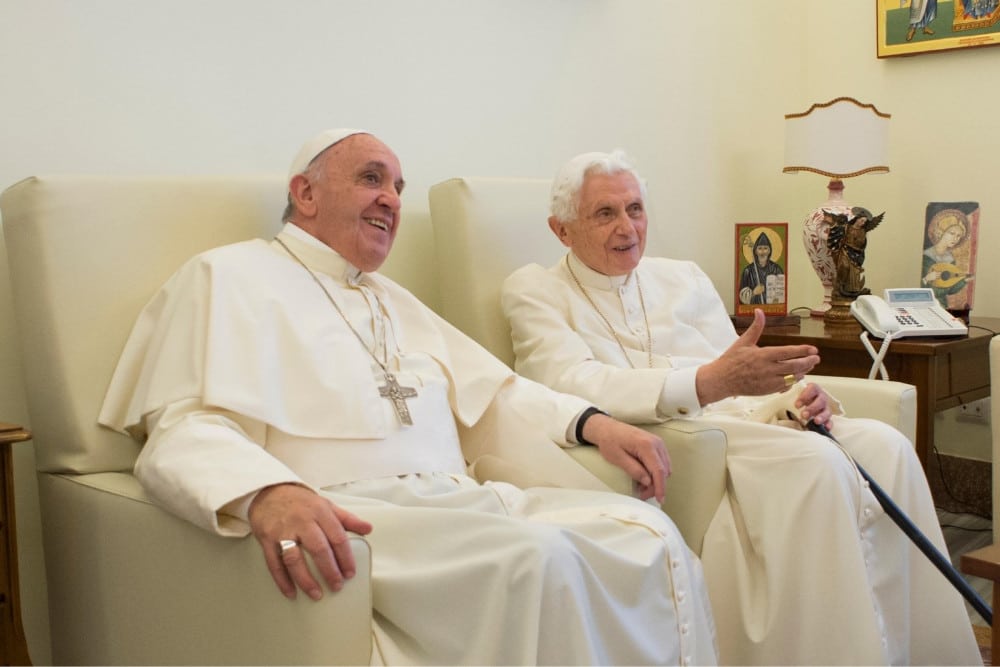We’re all in the same boat. So says Gaudium et Spes (“Joy and Hope”), the Catholic Church’s pastoral constitution promulgated by Pope Paul VI at the end of the Second Vatican Council on Dec. 7, 1965. The constitution uses different words, but the meaning is the same: Followers of Christ are not above or separate from other men and women but are part of one human family. Moreover, the Church as an organization exists alongside the many other organizations of mankind. Therefore, the Church can declare through Gaudium et Spes: “The joys and the hopes, the griefs and the anxieties of the men of this age, especially those who are poor or in any way afflicted, these are the joys and hopes, the griefs and anxieties of the followers of Christ” (No. 1).
Acknowledging the common situation of mankind may not seem very newsworthy these days, but it was a stark departure from many Church statements prior to 1965 that emphasized defensiveness and triumphalism. To drive the point home, the bishops enlisted the thought of a pre-Christian, Roman playwright, Terence, who wrote, “I am human, so nothing human is alien to me.”
Read more from our Church Document series here.
Gaudium et Spes, however, does not simply point out humanity’s common situation but also includes the Church’s conviction concerning humanity’s common destination. The Church believes that Jesus is the one Savior of all (cf. No. 10) and that he is the way to mankind’s divine destiny (Nos. 2-3, 22). Indeed, Jesus established the Church to fulfill a role of singular importance: to be his agent in the world, making him and his saving grace present by word and sacrament in all times. Moreover, Jesus commanded his Church to make disciples of all nations, promising the baptized the gift of the Holy Spirit to guide and sustain them along the way to heaven. Therefore, in a spirit of fraternity, the Church wants to share its hope in Christ and how it understands its role in the world.
Context
Reading Gaudium et Spes almost 60 years after it was promulgated, one needs to keep in mind the situation at that time. Many of the bishops drafting the text, along with the rest of the world’s population, had lived through two world wars that decimated society in the first half of the 20th century. They were also cognizant of the arms race brewing at the time. The bishops could — and did — point to positive developments as well: new technologies that increased the standard of living for many, as well as “an abundance of wealth, resources and economic power.” Still, the improvements in society did not reach everyone. The world remained plagued with enduring dichotomies: wealthy and poor, free and enslaved, peace and war (cf. Nos. 4-8).
Gaudium et Spes is addressed to “the whole of humanity” (No. 2), not simply members of the Church, because all men and women experience the joys and griefs of life. They experience happiness and troubles not only within society but also in their persons. Gaudium et Spes sets out to consider this human drama in all its complexity. It is a sprawling document with almost 30,000 words. The subject matter includes the human person and the community of mankind; it reflects on the activity of men and women; and it ponders “problems of special urgency”: marriage and the family, culture, economic life, the political community and the work for peace (No. 46).
Despite its sprawling scope, however, Gaudium et Spes maintains a fixed trajectory to the subject of its hope. Jesus is the source of salvation and the goal of mankind. He is the key to understanding the human person and the meaning of life. “Hence under the light of Christ, the image of the unseen God, the firstborn of every creature, the council wishes to speak to all men in order to shed light on the mystery of man and to cooperate in finding the solution to the outstanding problems of our time” (No. 10).
Content
In order to prepare readers to receive the good news about Jesus, the bishops begin Gaudium et Spes with reflections on what believers and unbelievers can hold in common: “According to the almost unanimous opinion of believers and unbelievers alike, all things on earth should be related to man as their center and crown” (No. 12). Indeed, men and women are unique among animals because they can know themselves. Therefore, they rise above “the whole sum of mere things” (No. 14). Humans use their intellect to master nature. They have created wonderful and varied works of art. They even seek wisdom in order to “love what is true and good” (No. 15). Men and women “thirst for a full and free life worthy of man” (No. 9). They even have an “intuition” that their lives do not end in “perpetual extinction” (No. 18).
However, despite these longings, aspirations and hopes, men and women remain beleaguered by evil, sin and death. Many individuals continue to question the worth of any victories or advancements when “purchased at so high a cost” (No. 10). Gaudium et Spes does not belittle these concerns but rather invites the reader to see them as further evidence of the human person’s uniqueness among creation. Even man’s questioning indicates his nature as a unity of body and soul, one who seeks to know himself in truth. And what man pursues in his searching comes to light through divine revelation, which confirms the longings and hopes of man and answers his doubts and questions. The human person can know by reason the existence of God (cf. No. 19). But the searcher who listens to the word of God finds a divine lover, one God — Father, Son and Holy Spirit — who not only created and sustains each human being but also came among mankind to open the doors to eternal life:
“The truth is that only in the mystery of the incarnate Word does the mystery of man take on light. … Through Christ and in Christ, the riddles of sorrow and death grow meaningful. … Christ has risen, destroying death by His death; He has lavished life upon us” (No. 22).
Jesus changes everything. Just as an individual person learns the full truth about himself or herself in the light of Christ, the relationships among men and women are understood more deeply when considered from the perspective of Christian revelation.
The community of mankind recognizes by living in society the benefits that come with interdependence. All men and women are responsible for the common good, “that is, the sum of those conditions of social life which allow social groups and their individual members relatively thorough and ready access to their own fulfillment” (No. 26). This includes “everything necessary for leading a life truly human”: material goods such as food and housing, and intangible ones such as education and the right to privacy (No. 26). But fulfillment considered in the light of Christ, while certainly attentive to this life, is ordered to eternal life.
The followers of Christ look forward to participating in the “the union of the divine Persons” (No. 24). In fact, by loving their brothers and sisters and developing the earth, Christ’s disciples anticipate the life of heaven. They know that sin and evil will pass away, but love and its works will remain (cf. No. 39). Therefore, they make the effort to exercise Jesus’ way of love “in the ordinary circumstances of life,” and they are strengthened on their journey by the gift of Jesus’ body and blood in the Eucharist, which is “a meal of brotherly solidarity and a foretaste of the heavenly banquet” (No. 38).
Call
Gaudium et Spes invites all people to come to know Jesus so that they, too, might enjoy eternal life with God. The same constitution calls the members of the Church to be a “leaven” in society by bringing their participation in Christ to bear upon their activities (No. 40). They do so by their fidelity to Christ and his Gospel rather than becoming obstacles, which Gaudium et Spes acknowledges has happened at times (cf. Nos. 19, 43). If, however, the members pine for God as the deer pines for running streams, then men and women will be drawn to Christ. The reason is that the love of God is inseparable from the love of neighbor. All the members of the Church witness to their love of God by their works of mercy and by the charity they have among themselves. The laity witness to Christ within the community of mankind, and the clergy preach the word of God by their words and deeds. In the end, as Gaudium et Spes states, “the Church has a single intention: that God’s kingdom may come, and that the salvation of the whole human race may come to pass” (No. 45).
David Werning writes from Virginia.







